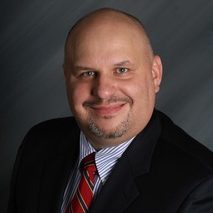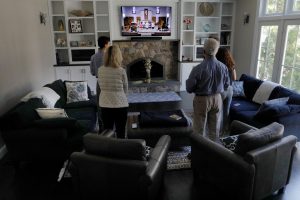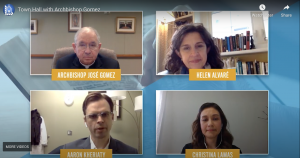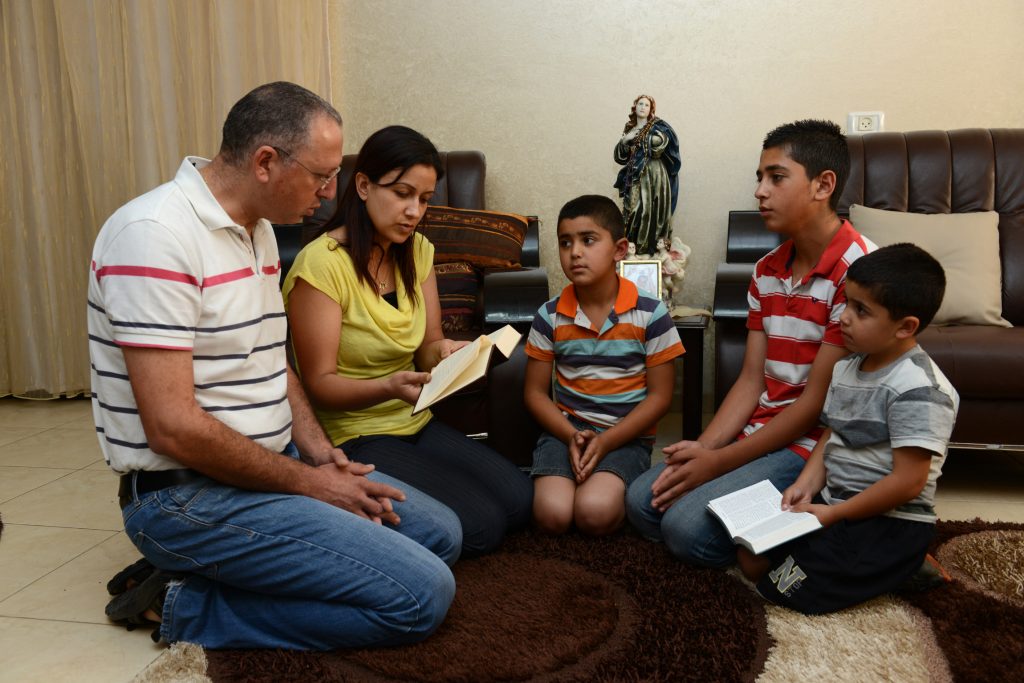Deborah DiPaulo sat down on her living room couch one Friday and turned on her laptop. She had cleared out her schedule for the whole evening and the next morning so that she could tune into the virtual event about to take place.
That event was the Catholic Family Conference, hosted completely online May 1-2. Through a series of lectures and panels, the conference brought together a host of prominent Catholic speakers and thousands of families from across the globe to reflect on the topics of faith, family, and finding hope in hardship.
“They touched me more than they realized,” said DiPaulo, 49, about the conference speakers, which included Angelus contributors Kathryn Jean Lopez and Dr. Scott Hahn. As a Catholic wife and mother of five living in Flowery Branch, Georgia, she found the virtual conference to be nourishment for her faith and family life.
“This, to be honest, brought me more into my Catholic faith,” she told Angelus in a phone interview. “I needed it to be a Catholic forum … so that I could direct [my family] the right way.”
As the coronavirus (COVID-19) pandemic continues to confine thousands of people to their homes, the question of how to strengthen family faith while separated from the sacraments and parish life has become increasingly prevalent. And as parish leaders have stretched to minister to their congregations from afar, a recurring theme has been the meaning of the family unit within the Church.

“The Church is the family of God — we are a family of families,” said Archbishop José H. Gomez at a May 6 virtual town hall organized by the Archdiocese of Los Angeles, echoing Pope Francis’ “Amoris Laetitia” (“The Joy of Love”).
While not a new teaching, the challenges brought on by the coronavirus pandemic have compelled the Church to proclaim and support the centrality of the family, or the “domestic church,” more than ever before.
Ancient yet overlooked
What exactly is the domestic church? The term first appeared in the Second Vatican Council’s dogmatic constitution, “Lumen Gentium” (“The Light of the Nations”). “The family is, so to speak, the domestic church,” the document states. “In it parents should, by their word and example, be the first preachers of the faith to their children; they should encourage them in the vocation which is proper to each of them, fostering with special care vocation to a sacred state.”
The council’s subsequent document on the laity, “Apostolicam Actuositatem” (“Apostolic Activity”), later revisited the topic, and Pope St. John Paul II expounded upon it in his 1981 encyclical “Familiaris Consortio” (“The Fellowship of the Family”).
According to Gregory K. Popcak, Ph.D., the concept stems from Vatican II’s promulgation of the “universal call to holiness,” or the fact that God calls all people, regardless of life circumstances, to be saints.
“It is the notion that every home is meant to be a sacred space and an outpost of grace in the world,” he told Angelus via email.

Popcak, founder and executive director of the Pastoral Solutions Institute, an organization of Catholic counselors, has researched and written about the domestic church for years. He noted that while Vatican II brought it to new light, the idea is as old as the Church itself.
As the Acts of the Apostles reveals, the first Christians fostered their faith within their homes and neighborhoods long before the establishment of monasteries, convents, and parishes.
Despite these ancient foundations, Popcak has often found the domestic church to be an overlooked teaching.
“Unfortunately, very little has been done to help families live out this vision in our homes,” he explained. “Until fairly recently, the phrase ‘domestic church’ has been employed as, at best, an aspirational term with little practical relevance.”
Part of the problem, Popcak continued, stems from a misunderstanding of the role of the Catholic parish.
“Catholics have a tendency to think that the parish is meant to be the center of our faith life. But that’s not what the Catholic theology of the Church actually teaches,” he said. “In reality, the parish church exists to support the Christian life and ministerial efforts of the domestic church: the family.”
Now that parishes across the world have closed their doors, families have had to reevaluate exactly what that means.
New light on an old teaching
Even with the ability to livestream services, the cancellation of public Masses and other gatherings has been a blow to pastors and parishioners alike. “Seeing the church totally empty is very sad,” said Archbishop Gomez at the archdiocese’s town hall.
Recently, Pope Francis also emphasized that while Catholics can stay united from afar through prayer, coming together in person is a crucial part of the faith. “This is the Church in a difficult situation that the Lord is allowing, but the ideal of the Church is always with the people and with the sacraments — always,” the Holy Father said in an April 17 homily.
At the same time, being cut off from the sacraments has inspired many Catholic families to appreciate them more than ever before. Hahn, a biblical theology professor at Franciscan University of Steubenville and renowned author, reflected upon this sensation in his address at the Catholic Family Conference.
“I was talking to [my daughter] Hannah just a couple of weeks ago,” said Hahn, “and she was describing to me how it was throughout this period that she came to realize how much she’s been taking the Holy Sacrifice of the Mass for granted, and how much more she has a kind of holy hunger, a longing for holy Communion like she has never known. … I realized that she was giving voice to what thousands — tens of thousands of us are feeling.”

For Popcak, the repercussions of the pandemic have brought his research on the domestic church to the fore. When asked about this shift in focus within Catholic discussions and events, he commented, “As truly painful as it is to be separated from the sacraments, the pandemic is forcing us to rethink how we ‘do church.’ ”
He added, “God is giving us an opportunity to rediscover an idea that has been hidden in plain sight since the early Church. Namely, it’s the Catholic home — not the parish, the parish school, or diocesan chancery — that is meant to be the crucible of intentional discipleship and primary outpost of evangelization.”
From idea to action
Within the context of the coronavirus, these discussions on the domestic church have also addressed how families can live it while observing shelter-in-place orders.
In his lecture, Hahn offered several practical recommendations. First and foremost was family prayer. “We all know that prayer is to the soul what breath is to the body,” he observed. “When you stop praying, you start suffocating.”
Hahn continued by emphasizing the importance of the “nucleus” of the family: marriage. “That, too, is a blessed sacrament,” he said. “So pray together as spouses.”
The LA town hall also included practical tips for families. In his remarks, Dr. Aaron Kheriaty, a psychiatrist at the University of California at Irvine and a father of five boys himself, first acknowledged the very real and acute difficulties individuals and families face while being confined: “What we’re going through is not normal for human beings,” he stated. “This has caused disruptions in our life, on a biological level … [and] on a social level.”
In response to these challenges, Kheriaty offered recommendations for quarantined families to sustain their physical, psychological, and spiritual health. “This can be a golden opportunity for family meal times,” he said, noting the benefits of maintaining a regular meal schedule, including stronger family bonds.
Kheriaty also said that many important activities, such as physical exercise and acts of service, can build family relationships and virtue when done together. “I think there are all kinds of little, simple, everyday ways that we can be in service to others, starting with the people close to us,” he said.
When it comes to putting the notion of the domestic church into action, Popcak refers to various components of family life that make up a kind of “liturgy.” Just as the ministerial priesthood of the clergy cannot exist without the liturgy of the Eucharist, he explained, the common priesthood of the laity cannot exist without the “liturgy of domestic church life.”
This kind of liturgy, he said, “presents an authentic, domestic-church-based spirituality that allows families to ‘bring Jesus home’ and make the faith the source of the warmth in their homes.”

To live this liturgy, Popcak continued, families must focus on three things: relationships, traditions, and service. Specifically, fostering an environment of affection; making time for prayer, conversation, and fun together; and serving others inside and outside of the home are key.
By doing so, families can make faith the source and center of their life and therefore fulfill their mission as the domestic church.
Making it stick
If the coronavirus pandemic has stimulated an increased appreciation for the domestic church, sustaining that appreciation after the pandemic passes will be just as vital a task. After all, in his April 17 homily, the pope urged Catholics to see this time as providential but temporary, and the Church must at some point resume the full activity of the sacraments and evangelization outside the home.
Nevertheless, hope is not lost that the good habits built during quarantine will disappear when busy, out-and-about schedules resume. Going forward, Hahn sees the opportunity for families to build on the lessons from this period and grow in their mission.
“When you get together and you listen to the truth of the Gospel with new ears, you get changed,” he told Angelus in a phone interview. “And when this quarantine is lifted, individual faithful members of the Church, but also faithful families are going to get going … to be fruitful apostles.”
For DiPaulo, the Catholic Family Conference is still impacting her life. She connected with several speakers on Facebook, where she continues to draw insights from them.
“I really knew God was going to bring fruit out of it,” she told Angelus. “He’s still working … and [he’s] not done yet!”
Now that his area of expertise has gotten increased attention, Popcak aspires to make the message of the domestic family more prominent than ever.
“I would like to challenge families to realize that their homes are meant to be spiritual powerhouses.”

